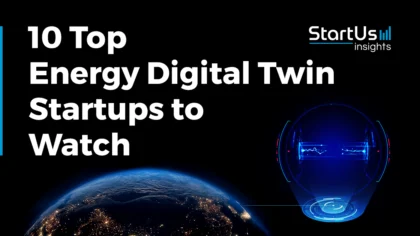Staying ahead of the technology curve means strengthening your competitive advantage. That is why we give you data-driven innovation insights into the energy industry. This time, you get to discover 5 hand-picked startups advancing photovoltaic (PV) projects.
Out of 220, the Global Startup Heat Map highlights 5 Top Startups advancing PV Projects
The insights of this data-driven analysis are derived from the Big Data & Artificial Intelligence-powered StartUs Insights Discovery Platform, covering 2 093 000+ startups & scaleups globally. The platform gives you an exhaustive overview of emerging technologies & relevant startups within a specific field in just a few clicks.
The Global Startup Heat Map below reveals the distribution of the 220 exemplary startups & scaleups we analyzed for this research. Further, it highlights 5 energy startups that we hand-picked based on criteria such as founding year, location, funding raised, and more. You get to explore the solutions of these 5 startups & scaleups in this report. For insights on the other 215 PV solutions, get in touch.
Prishija Energy develops Rooftop Photovoltaic Systems
Rooftops receive a relatively high amount of solar radiation in urban settings. Whereas, the architectural design of cities often renders ground-level PV panels inept. These solar panels, thus, do not generate an optimal amount of energy. To this end, startups develop rooftop solar projects that optimize energy generation by synergizing with the natural properties of radiation on rooftops.
Indian startup Prishija Energy offers rooftop PV projects. In particular, the project in Bikaner, Rajasthan is a grid-interactive solar rooftop PV system. It has a generation capacity of 120 kW and is installed on reinforced cement concrete (RCC) and tin roof. For an optimum generation, the PV modules face south with a 28⁰ tilt. Additionally, the startup provides an online tracking system and a mobile app for real-time monitoring. Through these projects, corporations gain the ability to rely on solar energy along with insights into savings and power usage.
Candela Renewables offers Single-Axis Tracking PV Systems
The operation of PV panels depends directly on solar radiation. The revolutions of the earth around the sun cause different angles of incidence for solar radiation. As a result, there is a limitation of static PV panels to generate a high amount of solar energy. To solve this issue, startups provide single-axis tracking PV systems that change the angle of incidence depending on the level of recipient solar radiation.
US-based startup Candela Renewables designs photovoltaic systems. In Antelope Valley in California, the startup engineers a large-scale single-axis tracking PV solution for residents and businesses around the region. The project has a generation capacity of 230 MW. Additionally, the startup implements a 50 MW generation linear-tracking PV system. Candela Renewables also designs projects across the USA, notably one in Arizona that generates 290 MW of solar energy. These projects enable individuals and businesses to avail themselves of optimal generation of solar energy.
Sinosoar provides Solar Energy for the Mining Industry
Heavy industries usually have high energy requirements. For example, extraction processes of mining, drilling, and digging require uninterrupted and huge amounts of power. The machines that run these processes typically utilize fossil-fuel-based electricity, which is unsustainable. To mitigate this, startups design solar projects that generate power for heavy industrial processes.
Sinosoar is a Chinese startup that offers solar power for small-scale and industrial uses. The startup provides solar mini-grids which are local and independent energy systems that generate, distribute, store and regulate power. They are a smaller version of the main grid and run alongside it. In addition, the startup offers turnkey services for solar hybrid power and supply systems, including design, product integration, and system installation along with operation and maintenance services. These solutions find use in the mining industry, where they reduce the energy costs and increase the reliability of power supply, through energy storage systems.
DERA Energy designs Large-Scale PV Projects
Certain regions in the world do not have access to a well-defined electricity grid due to a lack of infrastructure or location inaccessibility. As a result, these regions have limited availability of essential commodities such as lighting and heating or cooling. However, this provides an opportunity to establish renewables-based energy grids without hindering the energy structure in the region. Thus, startups develop PV projects to power regions with limited access to electricity.
Canadian startup DERA Energy develops PV projects across Africa, specifically Madagascar. In the city of Diego, the project generates 2.40 MW of solar power. In Mahajanga, the PV plant produces 1.20 MW of solar power. Finally, in Toamasina, the PV project produces 2.0 MW of power. The startup is working on the second phase of these projects to increase power output to a minimum of double of current capacity. The startup also works in hydro-power projects. Consumers of these facilities, thereby, receive green, renewable energy at cost-effective prices.
Oak Square offers Ground Solar Farms
With the increasing adoption of smart grids, renewable energy systems (RES) are gaining traction. Additionally, advancement in energy storage systems (ESS) and energy management systems (EMS) enables off-site utilization of renewable energy. Consequently, startups develop large PV projects in flatlands, away from urban centers. These lands receive high levels of solar radiation and provide uninterruptible power supplies (UPS) to smart cities.
US-based startup Oak Sqaure Partners provides ground solar farms. Two projects in Rhode Island have a power generation capacity of 250 kW. The projects feature an offtake of a 20-year REGrowth feed-in tariff. A project in Massachusetts has a power generation capacity of 422 kW. Besides these, the startup has several projects across Rhode Island and Massachusetts.
Discover more Energy Startups
Energy startups such as the examples highlighted in this report focus on high-power solar systems, community solar, and advanced photovoltaics. While all of these technologies play a major role in advancing the energy industry, they only represent the tip of the iceberg. To explore more energy technologies, simply get in touch to let us look into your areas of interest. For a more general overview, you can download our free Energy Innovation Report to save your time and improve strategic decision-making.









